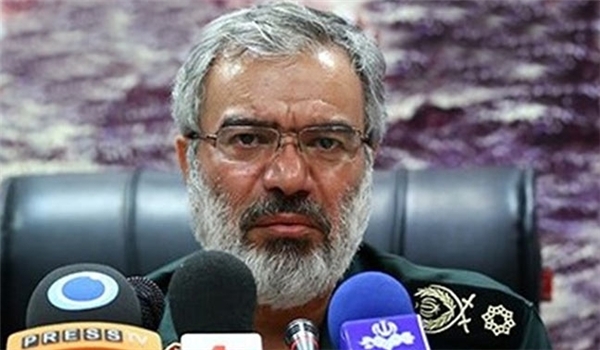http://english.farsnews.com/newstext.aspx?nn=13930215001597

“Conducting trainings, exercises and drills to get prepared for operational goals is always on our agenda and Americans and all the world know that one of the operational goals of the IRGC Navy is destruction of the US naval force,” Admiral Fadavi said in an exclusive interview with FNA.
He said the combat power of the United States in the air totally depends on the fighters flying from its aircraft carriers, “hence, that is a natural thing that we want to sink these vessels”.
The Admiral further noted the vulnerability of the United States’ giant warships and aircraft carriers, specially in any potential combat against Iranian missiles and speedboats in the Persian Gulf, and said, “If you take a look at Robert Gates’ book, you will see how he counts the vulnerabilities of aircraft carriers to the IRGC Navy and (that’s why) he asks for a change in the US naval strategy. This is no easy task, but they (the Americans) have started doing so as he has emphasized.”
The commander said the large size of the US warships has made them a very easy target for the IRGC naval force, specially taking into account that “we have very precise analyses of the design, construction and structures of these warships and we know how to act”.
Iran’s naval power has even been acknowledged by foes. In a Sep. 11, 2008 report, the Washington Institute for the Near East Policy said that in the two decades since the Iraqi imposed war on Iran, the IRGC has excelled in naval capabilities and is able to wage unique asymmetric warfare against larger naval forces.
According to the report, the IRGC Navy has been transformed into a highly motivated, well-equipped, and well-financed force and is effectively in control of the world’s oil lifeline, the Strait of Hormuz.
The study says that if Washington takes military action against the Islamic Republic, the scale of Iran’s response would likely be proportional to the scale of the damage inflicted on Iranian assets.
The IRGC Navy is responsible for protecting the security of the Persian Gulf, while the Iranian Army’s naval force is in charge of security in the Caspian Sea, the Sea of Oman and the high seas.
Different Iranian commanders have on numerous occasions warned that any US hostile move in the Persian Gulf would be suicidal as the IRGC would wreak havoc on the US Navy in the waterway.
On Wednesday, Admiral Fadavi cautioned that deployment of the US forces in the region has provoked insecurity.
“The presence of the US and the arrogant powers creates insecurity in the Persian Gulf since they are after their arrogant goals which are in opposition to the interests of the regional people,” Fadavi said in Tehran on Wednesday.
Stressing that security of the Strait of Hormuz should and can only be established by the regional states, he said, “The capability of the IRGC Navy is also playing a highly special role in the establishment of security in the Strait of Hormuz.”
Israel and its close ally the United States accuse Iran of seeking a nuclear weapon, while they have never presented any corroborative document to substantiate their allegations. Iran vehemently denies the charges, insisting that its nuclear program is for peaceful purposes only. Both Washington and Tel Aviv possess advanced weapons of mass destruction, including nuclear warheads.
Israel has on various occasions threatened to take military action against Iran. The United States has also always stressed that military action is a main option for the White House to deter Iran’s progress in the field of nuclear technology.
Iran has, in return, warned that it would target Israel and its worldwide interests in case it comes under attack by Washington or Tel Aviv.
Iran has also warned it could close the strategic Strait of Hormuz if it became the target of a military attack over its nuclear program.
Strait of Hormuz, the entrance to the strategic Persian Gulf waterway, is a major oil shipping route.
A recent study by a fellow at Harvard’s Olin Institute for Strategic Studies, Caitlin Talmadge, also warned that Iran could use mines as well as missiles to block the Strait, and that “it could take many weeks, even months, to restore the full flow of commerce, and more time still for the oil markets to be convinced that stability had returned”.









